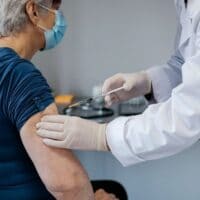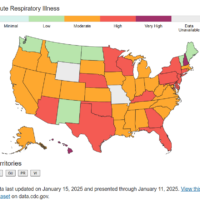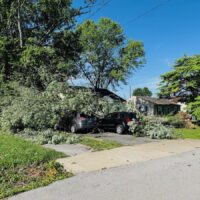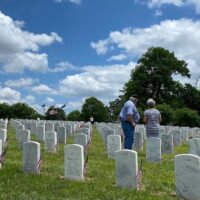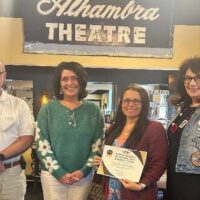In normal times, the resignation of a Hopkinsville mayor three years before his term expires, followed by the appointment of a council member as interim who eventually becomes the city’s first elected Black mayor, would easily be considered one of the most memorable news stories of the year.
Likewise, in most years, the return of Hopkinsville’s signature Ferrell’s hamburger restaurant from a devastating fire and the grand reopening of the local museum following an investment of approximately $1.5 million to renovate the downtown landmark and install a new exhibit space would be among the top stories of the year.
But nothing about 2020 was normal.
The coronavirus pandemic, which claimed 57 lives, made almost every other event in the community seem smaller or less significant by comparison. Often, the pandemic crowded out other events that might have produced newsworthy stories.
And the pandemic warped our sense of time. I don’t remember when a year has ever dragged on like this one.
The first two months of 2020 almost feel like they belong to a different year. Remember? That’s when Carter Hendricks left his post as mayor to become executive director of the South Western Kentucky Economic Development Council and Councilman Wendell Lynch was appointed interim mayor, followed by big turnouts for the openings at Ferrell’s and the Pennyroyal Area Museum.
Then March hit.
Kentucky’s first COVID-19 case, in Cynthiana, was confirmed on March 6, and several days later the Centers for Disease Control and Prevention was telling Americans that we shouldn’t gather in groups of more than 50 people at a time.
Local schools closed on March 16, shifting to virtual instruction as best they could, and students did not return before the summer break.
That same day, Gov. Andy Beshear announced bars and restaurants had to close by late afternoon. I stopped by Holiday Burgers and sat at the counter to order a pimento cheese sandwich for lunch. I was there mainly to take notes for a story, and I nursed a cup of coffee long enough to interview a few people. Many of the diner’s regulars were still eating breakfast at lunchtime, and they shared news updates from their cellphones with each other. Some of them thought the governor was overreacting. I could tell they were going to miss being able to see other and trade stories over fried eggs and plate lunch specials.
There was so much we didn’t know yet, and none of us seemed worried that day about sharing air in a small, packed restaurant. We hadn’t yet learned to use terms like “social distancing” and “incidence rate.” We didn’t know much about the difference between a “positive case” and a “close contact.”
The next day, day care centers had to close, and Beshear announced Kentucky’s May primary election was being pushed to June 23.
On March 19, Christian County Health Director Kayla Bebout called a news conference at the health department to announce the first confirmed case of COVID-19 in this community — a 61-year-woman who was dealing with the illness at home.
The same day, Beshear issued a ban on mass gatherings and in-person church services.
On March 22, several churches in Christian County joined a simultaneous bell-ringing to signal a unified state. Christian County Historian William T. Turner rang a large bell on his farm at the same time, and his wife captured the moment in a photograph.
By the third week of March, the governor had signed an executive order closing all non-essential businesses. Kentuckians were told to follow the state’s Healthy at Home guidelines.
On April 8, Jennie Stuart Health laid off 248 employees as the hospital stopped elective procedures to prepare for the possibility of a large number of COVID-19 patients.
That day the health department confirmed Christian County’s first coronavirus-related deaths — an 86-year-old man, an 86-year-old woman and a 76-year-old man. All three had underlying health conditions, the health department reported.
One by one, organizers began canceling or postponing events. Hopkinsville’s Summer Salute was canceled, the public library’s summer reading session became a virtual program and the Hopkinsville Rotary Auction was pushed into September. The Kentucky Derby was also delayed until fall. The Western Kentucky State Fair also was canceled.
Through April and May, the number of new COVID-19 cases in Christian County increased by single digits, or none at all, most days.
On June 1, the number of cases that had been confirmed up to that date was 125, and the number of deaths remained at three. A month later, there had been 249 cases confirmed and four deaths.
On Aug. 1, the county had confirmed 575 cases and six deaths, and by Sept. 1, 894 residents had tested positive and 14 local deaths had been attributed to the virus.
On Sept. 17, Christian County’s incidence rate reached 28. It was the first time the rate was in the critical red zone for counties at a rate of 25 or more.
From Oct. 1 to Dec. 1, the county’s coronavirus case count increased from 1,367 to 3,041, and the death toll went from 23 to 46.
The incidence rate peaked at 67.9, the highest mark during the pandemic, on Dec. 16.
In mid-December, the U.S. Department of Health and Human Services began releasing data that show the impact of COVID-19 patient care on American hospitals. The report revealed the toll on Jennie Stuart Medical Center put the local hospital under “extreme stress.”
Two days before Christmas, Jennie Stuart Health announced it had received 500 doses of the Moderna coronavirus vaccine and distribution began among the hospital’s frontline workers. The Christian County Health Department also received its initial shipment of vaccine and began giving shots to its employees and first responders the week after Christmas.
In the final COVID-19 report of 2020 from the health department, 4,310 coronavirus cases had been confirmed through Dec. 31, and there were 57 virus-related deaths.
[INSERT_ELEMENTOR id=”30808″]
Jennifer P. Brown is co-founder, publisher and editor of Hoptown Chronicle. You can reach her at editor@hoptownchronicle.org. Brown was a reporter and editor at the Kentucky New Era, where she worked for 30 years. She is a co-chair of the national advisory board to the Institute for Rural Journalism and Community Issues, governing board past president for the Kentucky Historical Society, and co-founder of the Kentucky Open Government Coalition. She serves on the Hopkinsville History Foundation's board.
